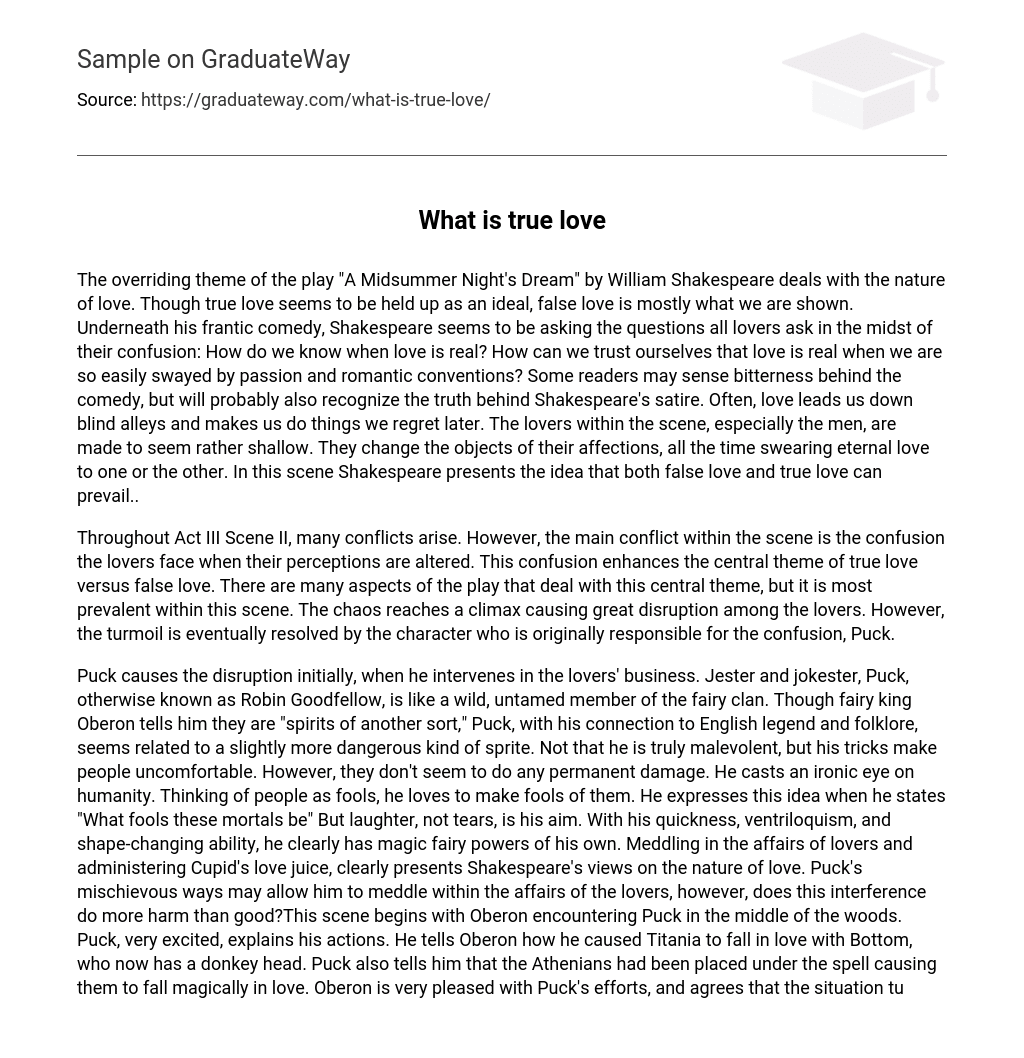The play “A Midsummer Night’s Dream” by William Shakespeare primarily explores the concept of love. While true love is portrayed as an ideal, the play mainly focuses on false love. Beneath the humor, Shakespeare raises universal questions that all lovers face during times of confusion. How can we distinguish real love? How do we trust ourselves when passion and societal norms easily sway us? Some readers may detect a hint of bitterness in the comedy but will also recognize the truth within Shakespeare’s satire. Often, love leads us astray and compels us to engage in regrettable actions. The characters in the scene, particularly the men, appear shallow as they constantly change their affections and pledge eternal love to different individuals. Through this scene, Shakespeare suggests that both false love and true love can prevail.
In Act III Scene II, various conflicts arise, but the main conflict is the lovers’ confusion due to altered perceptions. This confusion highlights the central theme of true love versus false love, which is prevalent throughout the play. The lovers’ turmoil reaches a climax, causing disruption, but it is ultimately resolved by Puck, who initially caused the confusion.
Puck is responsible for the initial disruption by interfering in the affairs of the lovers. Known as Robin Goodfellow, he is a mischievous member of the fairy clan. Although Oberon, the fairy king, describes them as different spirits, Puck’s connection to English legend and folklore suggests a riskier kind of sprite. While not truly malicious, his pranks make people uneasy, but they do not cause any lasting harm. Puck views humanity as foolish and delights in making fools of them, as he famously declares, “What fools these mortals be.” However, his goal is to provoke laughter, not tears. His magical fairy powers include quickness, ventriloquism, and shape-shifting abilities. By meddling in the lovers’ affairs and administering Cupid’s love potion, Shakespeare expresses his thoughts on the nature of love. Although Puck may disrupt the lovers’ lives with his mischievous ways, it raises the question of whether this interference does more harm than good. The scene begins with Oberon encountering Puck in the forest, where an excited Puck explains his recent actions. He describes how he caused Titania to fall in love with Bottom, who now has a donkey head. Furthermore, Puck reveals that he placed a magical spell on the Athenians, making them fall in love.Oberon expresses great satisfaction with Puck’s actions and acknowledges that the outcome exceeded their expectations. Nevertheless, Oberon soon becomes aware that Puck had erred by making the Athenian fall in love with the incorrect individual.
Oberon reprimands Puck for his error, as Puck’s actions have not only caused a reversal of true love, but the creation of “false turned true” love as well. Puck retorts that this outcome is governed by the rules of fate, where countless individuals fail in their pursuit of true love while only a few succeed in maintaining their vows. Oberon had hoped for a resolution to the situation, not a further complication, but Puck always enjoys adding an extra twist. “Then fate o’er-rules, that, one man holding troth, A million fail, confounding oath on oath.” By saying this, Puck underscores the overwhelming odds against finding true love, implying that humans will need very astute perception to discern love accurately. Puck’s mischief transforms what was supposed to be true love into its opposite. However, this turns out to be beneficial for both Helena and Demetrius. Utilizing his magical powers, Puck brings the lovers together under a facade of false love. This counterfeit affection is what bonds them, demonstrating that false love can possess equal strength to true love.
The nature of love is demonstrated through the characters Lysander and Hermia, as well as Puck’s interference in their lives. While under Puck’s spell, Lysander falsely loves Helena and becomes blind to his true feelings for Hermia. He insults Hermia and even claims to hate her. Hermia questions if he could harm her more than through his hatred alone, clearly showing her heartbreak. This showcases the complexities and twists associated with love according to Shakespeare. Love is a challenging journey that cannot be easily achieved. Despite their constant conflict, Hermia and Lysander ultimately remain in love and prove that true love can triumph.
In “A Midsummer Night’s Dream,” William Shakespeare explores the complexities of love. The play portrays both false love and true love, ultimately suggesting that all forms of love can ultimately succeed. Hermia and Lysander exemplify the concept of “true love,” while Helena and Demetrius represent its polar opposite. Shakespeare argues that love is capricious and can lead to significant bewilderment. Love is an enigma that defies explanation, existing only as a personal experience. Shakespeare encourages his audience to form their own understanding of the true nature of love. Bibliography:





